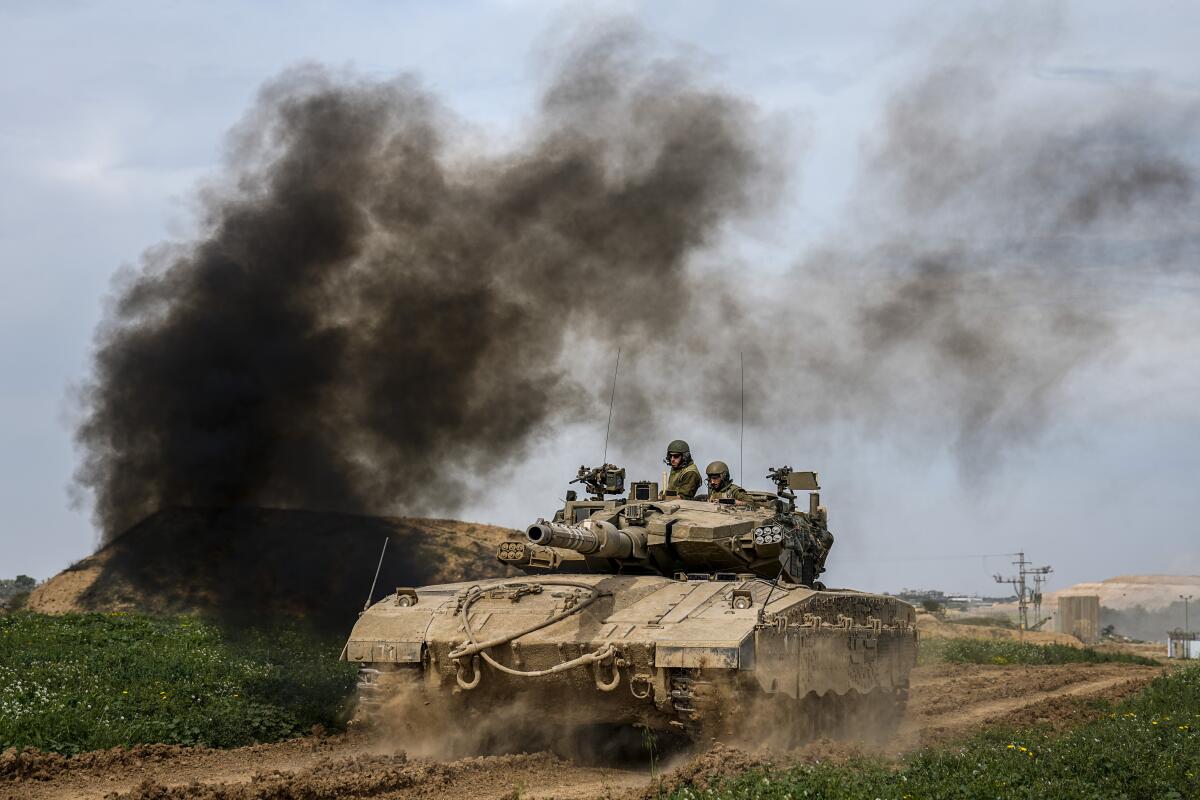Israel and Hamas are making progress in cease-fire and hostage-release talks, officials say

- Share via
CAIRO — Israel and Hamas are making progress toward another cease-fire and hostage-release deal, officials said Tuesday, as negotiations went on and Israel threatened to expand its offensive to Gaza’s southern edge, where some 1.4 million Palestinians have sought refuge.
The talks continued in Egypt a day after Israeli forces rescued two captives in Rafah, the packed southern town along the Egyptian border, in a raid that killed at least 74 Palestinians, according to local health officials, and caused heavy destruction. The operation offered a glimpse of what a full-blown ground assault might look like.
A cease-fire deal, on the other hand, would give people in Gaza a desperately needed respite from the war, now in its fifth month, and offer freedom for at least some of the estimated 100 people still held captive in Gaza. Qatar, the United States and Egypt have sought to broker a deal in the face of starkly disparate positions expressed publicly by both Israel and Hamas.
Israel has made destroying Hamas’ governing and military capabilities and freeing the hostages the main goals of its war, which was launched after thousands of Hamas-led militants attacked in southern Israel on Oct. 7, killing 1,200 people, mostly civilians, and taking roughly 250 people captive. Tens of thousands of Israelis were displaced from destroyed communities.
The war has brought unprecedented destruction to the Gaza Strip, with more than 28,000 people killed, more than 70% of them women and minors, according to local health officials. Vast swaths of the territory have been flattened by Israel’s offensive, around 80% of the population has been displaced and a humanitarian catastrophe has pushed more than a quarter of the population toward starvation.
South Africa, which has lodged genocide allegations against Israel at the International Court of Justice, said Tuesday that it filed an “urgent request” with the court to consider whether Israel’s military operations in Rafah constitute a breach of provisional orders handed down by the justices last month. Those orders called on Israel to take greater measures to spare civilians.
Israel has adamantly denied the genocide allegations. It blames Hamas for the high death toll because the militants operate in dense residential areas. Israeli Prime Minister Benjamin Netanyahu has vowed to press on until “total victory.”
A senior Egyptian official said mediators have achieved “relatively significant” progress ahead of a meeting Tuesday in Cairo of representatives from Qatar, the U.S. and Israel. The official said the meeting would focus on “crafting a final draft” of a six-week cease-fire deal, with guarantees that the parties would continue negotiations toward a permanent cease-fire.
CIA chief William Burns and David Barnea, head of Israel’s Mossad spy agency, attended the Cairo talks. Both men played a key role in brokering the previous cease-fire.
A Western diplomat in the Egyptian capital also said a six-week deal was on the table but cautioned that more work is still needed to reach an agreement. The diplomat said the meeting Tuesday would be crucial in bridging the remaining gaps.
Both officials spoke on condition of anonymity because they were not authorized to discuss the sensitive talks with the media.
While the officials did not disclose the precise details of the emerging deal, the sides have been discussing varying proposals for weeks.
Israel has proposed a two-month cease-fire in which hostages would be freed in exchange for the release of Palestinians imprisoned by Israel, and top Hamas leaders in Gaza would be allowed to relocate to other countries.
Hamas rejected those terms. It laid out a three-phase plan of 45 days each in which the hostages would be released in stages, Israel would free hundreds of imprisoned Palestinians, including senior militants, and the war would wind down, with Israel withdrawing its troops. That was viewed as a nonstarter for Israel, which wants to topple Hamas before ending the war.
But President Biden signaled this week that a deal might be within reach.
“The key elements of the deal are on the table,” Biden said Monday alongside visiting Jordanian King Abdullah II, adding, “there are gaps that remain.” He said the U.S. would do “everything possible” to make an agreement happen.
Magdy reported from Cairo, Jobain from Rafah, Gaza Strip, and Goldenberg from Tel Aviv. AP writer Gerald Imray in Cape Town, South Africa, contributed to this report.
More to Read
Sign up for Essential California
The most important California stories and recommendations in your inbox every morning.
You may occasionally receive promotional content from the Los Angeles Times.










